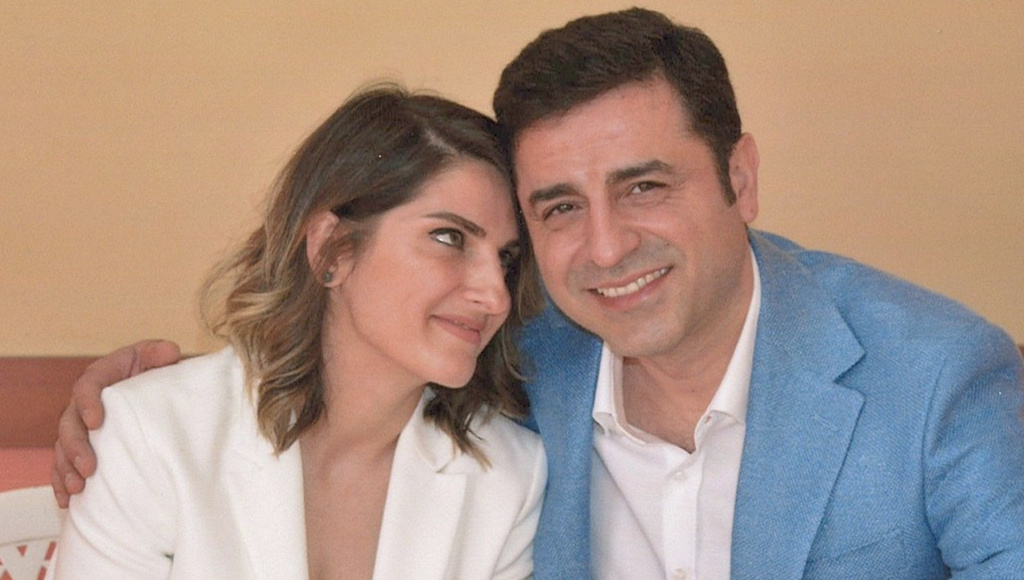Başak Demirtaş, the wife of jailed Kurdish leader Selahattin Demirtaş, criticized prolonged COVID-19 restrictions in prisons preventing families from having physical contact with their loved ones, on a program broadcast by Turkey’s FOX TV on Wednesday, the Stockholm Center for Freedom reported.
In the interview Başak Demirtaş urged the Justice Ministry to lift the measures and allow contact visitation. “My daughters have not been able to touch or hug their father for 19 months,” she said. “The restrictions are completely arbitrary.”
Başak Demirtaş added that both she and her husband were vaccinated and should be allowed contact. “We only get to see Selahattin twice a month behind a glass screen. This is not fair,” she said.
Turkey’s broadcasting watchdog, the Radio and Television Supreme Council (RTÜK), said on Twitter it had launched an investigation into FOX TV due to Başak Demirtaş’s comments.
Demirtaş, who was the co-chairperson of the pro-Kurdish Peoples’ Democratic Party (HDP) when he was arrested in November 2016, has been behind bars since then despite a decision from the European Court of Human Rights (ECtHR) in November 2018 that ruled Demirtaş’s pre-trial detention was a political act and ordered his release. Turkish courts refused to implement the European court’s ruling, and a regional appeals court in Turkey subsequently upheld a prison sentence handed down to Demirtaş for disseminating terrorist propaganda.
Demirtaş was an outspoken critic of Turkey’s ruling Justice and Development Party (AKP) and its leader, President Recep Tayyip Erdoğan, before he was jailed. He ran in the presidential elections of 2014 and 2018 as a rival to Erdoğan. Demirtaş conducted his election campaign from jail for the 2018 election.
Erdoğan has accused of Demirtaş of being a “terrorist” due to his alleged links to the outlawed Kurdistan Workers’ Party (PKK) and has slammed calls for his release.
Families of inmates have voiced protests as contact visitation in Turkish prisons has not been allowed since the beginning of the pandemic despite the elimination of restrictions even for such large gatherings as weddings and concerts.
Even if the inmates have been vaccinated, the families can only see their loved ones behind glass panels during non-contact visits.
In contact visitation, the inmate and visitor are permitted in the same area without a barrier between them, under close supervision.
According to Mehmet Durakoğlu, chairperson of the İstanbul Bar Association, the pandemic is being abused by the government as a tool to legitimize rights restrictions and is especially true for prisons. “Precautions can be taken to save lives, but they should be done within the limits of the law,” Durakoğlu said.
The rapidly spreading COVID-19 has presented great concerns in Turkey’s prisons, which were already notorious for human rights abuses, overcrowding and unsanitary conditions before the pandemic. The purge of thousands of dissidents in the aftermath of a coup attempt in July 2016 has filled Turkey’s prisons, which today are overcrowded with tens of thousands of political prisoners.
The Turkish parliament passed an early parole law in April 2020 aimed at reducing the inmate population of the country’s overcrowded prisons due to the coronavirus pandemic. Yet, the legislation excluded political prisoners, including opposition politicians, journalists, lawyers, academics and human rights defenders convicted under the country’s controversial counterterrorism laws. The law prompted calls from the UN, the EU and rights groups for the non-discriminatory reduction of prison populations.



